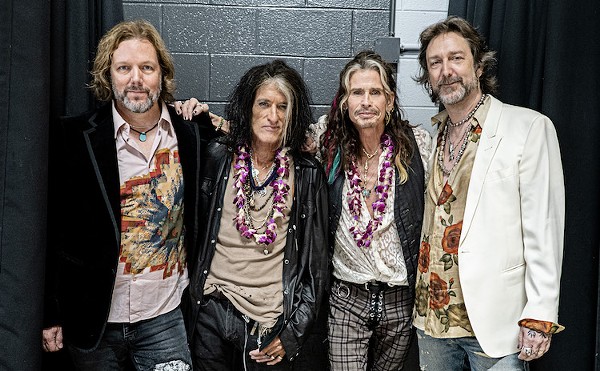Label: Verge
Length: LP
Media: CD
Format: Album
WorkNameSort: $1,99
As clichéd as it sounds, music is truly a universal language. Just ask trumpeter and MC Ben Lamar and Brazilian hip-hop lyricist Edu Lopes. Both were raised on samba and bossa nova, specifically on Tom Jobim classics, but in two very different parts of the world. For Lopes, who grew up in Rio de Janeiro, these genres are part of his country's sonic staple. Lamar, on the other hand, is a child of Chicago's South Side. The fact that he was exposed to his father's extensive Brazilian music collection from an early age made him unique among his peers. Now, Lopes and Lamar are part of A Filial, a five-piece Brazilian hip-hop collective that includes sambista and cavaquinho player Flávio 52, samba percussionist Rodrigo Pacato and DJ Castro.
'Edu and I somehow found a way to communicate with my non-existent Portuguese and his terrible English,â?� Lamar says via e-mail. 'We taught one another each other's language just from him picking me up from my overpriced, 'gringo'-rate Copacabana apartment and hanging out discussing music. Actually Edu and I became friends through our similar childhood love for the music of Jobim. Edu would sing the lyrics and I would hum the melody.â?�
While the core of Lamar and Lopes' musical communion was nurtured by the bossa nova master, the hip-hop crew's sophomore full-length, $1,99, is more than just a confluence of hip-hop, samba and bossa nova cool. Back in 2007, A Filial kicked off the much-lauded Verge Records sampler, The Inspiring New Sounds of Rio de Janeiro and introduced themselves as a Brazilian hip-hop act imbued in the mellow, retro strains of De La Soul with a distinctly homegrown vibe. On $1,99, the band expands its palette by mixing a plethora of Brazilian roots music and other world influences within the fold of rap. With one ear glued to the distinct sounds of northeast Brazil and another to the old-school rap from Lamar's stateside upbringing, A Filial deftly brings relatively obscure rhythms to the fore. Listening sessions in Lamar and Lopes' old apartment in the bohemian neighborhood of Santa Teresa (including American hip-hop forefathers like Run-DMC, Wu-Tang Clan and NWA) while they explored the vast diversity of overlooked rhythms and styles from the northeast like forró, frevo and maracatu.
A Filial began to coalesce eight years ago, before Lamar was even in the picture. A product of Rio's skateboarding scene and the epicenter of the city's music underground in the '90s, Lopes created the loosely assembled collective of rappers and musicians after breaking with his former group, Funk Fuckers. According to Lamar, a former teacher, skateboarding is an essential facet of his country's hip-hop culture ' a 'fourth elementâ?� added to American hip-hop's longstanding trinity: rapping, breaking and graffiti. Lopes, explains Lamar, formed A Filial with the idea of building an open format for making music unbound by defined paradigms. 'This way he could continue developing a method of working he's had since 1996,â?� Lamar says. 'Basically friends getting together, jamming and trying to fuse the love of their music culture with their love of other traditions and methods of music of the outside world.â?�
Like the Brazilian equivalent of a dollar store, $1,99 makes this brand of hip-hop accessible to a cross section of listeners worldwide. It even flows with the sound of nature: the calls of toucans, monkeys, insects and cicadas seeped into the music during the recording process and meshed with the boom-bap bass, old-school scratching, big-band brass samples, samba and maracatu. 'If you just put a mic outside the window, you could capture real music â?¦ the music of nature,â?� says Lamar. The percolating samba percussion, courtesy of Pacatu's malleable hands, and Flávio 52's cavaquinho strumming may be regionally based, but Lamar infuses some old-school American swagger. On some tracks, Portuguese and English rapping intermingle, and Lamar even tips his hat to Southern hospitality on 'Baião One Two,â?� a song about the global food crises.
According to urban legend A Filial recorded their very first tracks using a PlayStation, a karaoke machine, a 10-dollar mic and a musical toy, all dubbed down on a secondhand cassette. Adding to the limitations of DIY-bedroom production was the inconvenience of being robbed, multiple times, at gunpoint. Despite the obstacles, $1,99 proudly shows off its rudimentary roots, with A Filial members spitting out rhymes on cheap mics and laying down beats on cracked software in a non-soundproofed apartment surrounded by forests, overlooking 'the asphalt,â?� as Rio is known to favela dwellers.
'The people there have the skill to make do with many things that other people would have no idea how to utilize,â?� Lamar says. 'I wouldn't say, for this recording, that we used anything 'innovative.' I think the innovativeness lived in our endurance.â?�
















